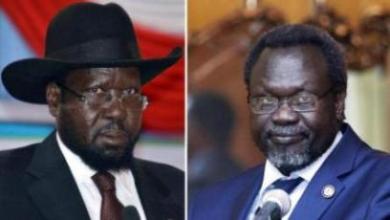S. Sudan rivals ink power-sharing deal in Ethiopia
By Tesfa-Alem Tekle
February 2, 2015 (ADDIS ABABA) – South Sudanese president Salva Kiir and opposition leader Riek Machar partially signed a symbolic power-sharing agreement proposed by the Intergovernmental Authority on Development (IGAD) on Monday, recommitting themselves to further negotiations on outstanding issues.

According to the new power ratios the South Sudanese government will take up 53%, the SPLM-factions 33%, while other political parties will share the balance.
The parliament will now be expanded to 548 members and shall be dissolved and reconstituted according to the power ratios.
This means the government will comprise 290 members, while the breakaway SPLM factions and other political parties will make up 181 and 77 members respectively.
IGAD’s chief mediator and former Ethiopian foreign minister, Seyoum Mesfin, told journalists that the two principals had agreed to resume further negotiations on 20 February to iron out the remaining differences..
During the recess the two warring parties will consider power-sharing arrangements for the transitional government.
Mesfin said the next direct talks “would be final and that would lead them into concluding a comprehensive agreement to end the crisis in South Sudan” by 5 March.
According to rebel officials, previously dismissed governors will be jointly appointed by Kiir Machar.
However, rebel officials disputed the power-sharing ratios, telling Sudan Tribune that discussions on the matter will resume on 20 February.
Rebels have called for Machar’s SPLM in Opposition, along with the third faction, to share an equal 45% of the power ratio with the government, while other political parties take the remaining 10% share.
They also stressed that the government should be reconstituted at all levels with no exception.
IGAD SUMMIT FAILS TO GO AHEAD
Meanwhile, a planned summit of IGAD leaders to discuss what action to take against the warring parties has failed to take place.
Sources close to IGAD alleged that an exchange of threats and counter-accusations ensued between the presidents of Uganda and Sudan during an initial gathering.
In remarks Ugandan president Yoweri Museveni reportedly suggested the need to crush Machar’s forces militarily, accusing his Sudanese counterpart, Omer Hassan al-Bashir, of supporting South Sudanese rebels.
Bashir responded by accusing Museveni of interfering in the conflict and providing support to Sudanese rebels, warning that both Museveni and Kiir would lose power if Sudan was to back Machar’s fighters.
DEAL DESCRIBED AS NON-AGREEMENT
Observers have expressed pessimism about the latest agreement’s ability to halt the conflict, citing ongoing preparations by warring parties on the ground for further military offensives.
Some international experts questioned the significance of the deal itself, describing it as a “non-agreement”.
A policy analyst on both Sudan and South Sudan currently in Addis Ababa monitoring the negotiations between the South Sudanese factions said IGAD had failed to secure a meaningful deal.
“The red-eyed negotiations just concluded in Addis Ababa could have been a turning point in South Sudan’s conflict. Instead, IGAD has reached another non-agreement,” said the Enough Project’s policy analyst, Justine Fleischner.
She criticised IGAD leaders for acting in their own interests, arguing that the absence of the promised sanctions of regional travel bans and asset freezes meant the warring parties had felt little urgency to adjust their behaviour.
“IGAD’s unwillingness to impose sanctions is in part due to competing regional economic interests and business ties. Meanwhile, the cost of war is being paid by the people of South Sudan,” she said.
The anticlimactic conclusion to the 29th IGAD heads of state summit reflected the warring parties’ lack of interest in achieving a peaceful resolution to the crisis, she said.
“As tanks burn in Upper Nile with the charred remains of their operators still inside, IGAD remains unwilling to break the deadlock by creating consequences for the parties and their uncompromising desire to hold power no matter the cost,” said Fleischner.
NO PEACE WITHOUT JUSTICE
Another analyst, Akshaya Kumar, is also pessimistic about how the African Union (AU) intends to handle the atrocities committed by both parties, saying it’s unlikely the first ever Commission of Inquiry report will never see the light of day.
“The AU and IGAD seem willing to sacrifice accountability to get an agreement, but there can be no lasting peace and security without justice,” she said.
She argued that as “South Sudan’s elites play a game of political musical chairs in Addis Ababa,” it’s becoming obvious that their machinations at the negotiating table have little to do with addressing the grim reality of the civil war back home in South Sudan.
It’s understood that regional leaders who dispersed without a decision will likely reconvene after the two parties resume negotiations on 20 February.
Government and rebel forces have been engaged in an armed conflict since mid-December 2013 after a political dispute within the ruling SPLM party over reforms turned violent.
Ongoing negotiations, which are being mediated by IGAD, have so far failed to yield a lasting settlement to the crisis, with both parties coming under increasing international pressure to set aside their political differences and end the crisis.
(ST)
– IGAD summit postponed again as warring parties renegotiate agreement terms
– IGAD summit on S. Sudan postponed as SPLM-IO lambastes proposed deal
